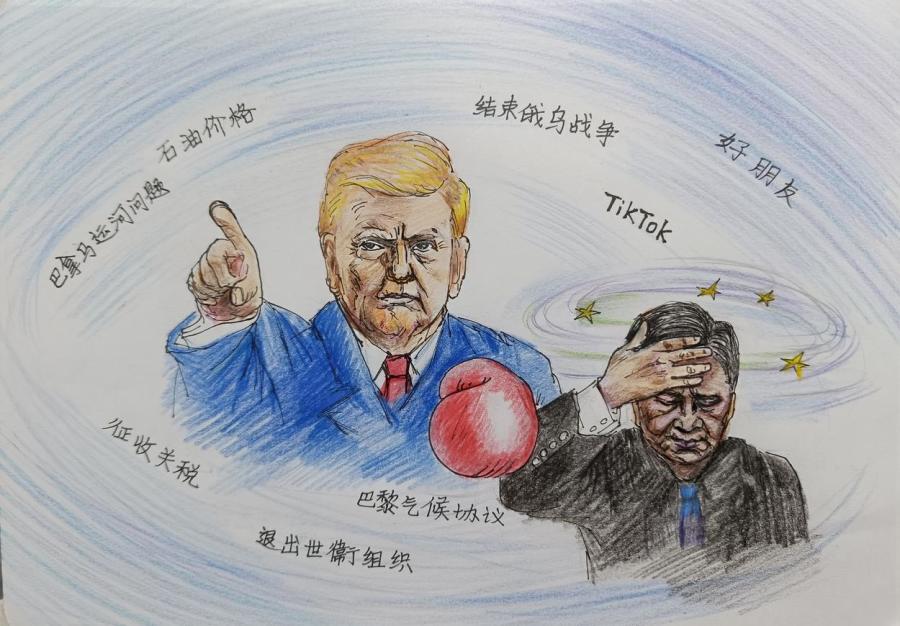Trump's soft and hard tactics leave the CCP disoriented. (Image by Qing Yu / People News)
[People News] On February 5, the U.S. Postal Service (USPS) announced that it would temporarily stop accepting inbound packages from China Post and Hongkong Post until further notice. CNN and Bloomberg reported that USPS did not specify the reason for the suspension, though it is likely related to President Donald Trump’s recent decision to remove the de minimis tax exemption for imported goods valued under $800.
On February 1, President Trump signed an executive order imposing an additional 10% tariff on Chinese goods. That same day, he also revoked the de minimis tax exemption for imports valued under $800. This move dealt a severe blow to Chinese cross-border e-commerce platforms such as Shein and Temu.
To facilitate domestic consumers, many countries implement de minimis rules in their import policies, allowing duty-free exemptions and simplified customs procedures for imports under a certain value or weight. Australia’s de minimis threshold is $1,000, Canada’s is $20, and the European average is around $190. Under Section 321 of the U.S. Tariff Act of 1930, goods valued at less than $200 were originally exempt from import duties and customs inspections by U.S. Customs and Border Protection (CBP). In 2016, the U.S. Congress raised this exemption threshold to $800.
China’s e-commerce platforms have taken full advantage of these de minimis policies. In recent years, Chinese apps like Temu and Shein have expanded rapidly worldwide. The volume of de minimis packages entering the U.S. has surged—from approximately 140 million a decade ago to over 1 billion in 2023, an increase of over 600%. Data from the U.S. Census Bureau also shows that in 2023, the total value of tax-exempt, low-value imports from China reached $4.7 billion, more than doubling since 2014. These shipments made low-value Chinese imports the eighth-largest import category in the U.S. In fiscal year 2024, the number of de minimis packages has already exceeded 1.36 billion.
In January 2024, market analysis firm data.ai released its 2024 Mobile Market Report, revealing that Shein remained the most downloaded shopping app globally in 2023. It also secured a dominant 40% market share, making it the largest fast-fashion brand in the U.S. Temu, Amazon, and AliExpress ranked second, third, and ninth, respectively, in shopping app downloads for 2023. According to logistics consultancy ShipMatrix, Shein ships an average of 1 million packages per day in 2024. As of January 2024, Temu had over 50 million monthly active users in the U.S., a year-over-year increase of 300%. Its app downloads surpassed 123 million, and it accounted for 60% of total goods sold in the U.S.
What has allowed Temu and Shein to expand overseas so easily and remain so attractive? The answer lies in their ultra-low prices. Exemption from duties and simplified customs inspections turned the U.S. into a goldmine for Chinese e-commerce. However, Temu and Shein’s rapid growth has disrupted American domestic e-commerce, harmed economic order and consumer rights, and even posed national security risks. During fiscal years 2023-2024, 94% of all import transactions entered the U.S. through the de minimis exemption, accounting for 90% of all seized illegal drugs and counterfeit goods. This has sparked widespread concern and heated debate within the U.S. government and Congress.
People’s Concerns Center on the Following Issues:
First, regarding employment and fiscal revenue, the de minimis exemption allows Chinese manufacturers to bypass the U.S. tariff system and flood the U.S. market with low-cost goods, creating unfair competition for American manufacturers and small-to-medium enterprises (SMEs). This threatens domestic industries and jobs. For example, due to the influx of cheap Chinese textiles, North Carolina’s textile industry has shut down, leaving workers unemployed and factories idle. Additionally, The Wall Street Journal pointed out that the de minimis policy has resulted in an estimated $67 billion in lost tax revenue.
Second, in terms of business competition, Temu’s rapid rise has significantly impacted Amazon’s U.S. operations. In January 2024, Amazon was forced to slash commission fees in its apparel category—reducing the rate from 17% to 5% for items under $15 and from 17% to 10% for those above $15. Temu’s “low-price storm” has also hurt brick-and-mortar discount stores. As of February 2024, Temu’s market share in the U.S. discount retail sector surpassed 17%, while Dollar General, a leader in offline discount stores, saw a sharp decline in market share over the past year.
Third, there is a severe trade imbalance. The U.S. de minimis threshold is $800, while China’s is 50 yuan (about $7). This asymmetry further exacerbates the unfairness in U.S.-China trade, preventing American businesses from enjoying the same benefits. Furthermore, the de minimis policy provides an easy gateway for low-quality, forced labor, and counterfeit Chinese goods to enter the U.S.
According to a BBC report, Shein operates a manufacturing hub in Guangzhou called “Shein Village,” where about 5,000 factories supply its goods. Workers reportedly work 30 or 31 days a month, averaging 75 hours a week. Their wages are based on piecework, earning 1-2 yuan per T-shirt. A skilled worker can produce 10 shirts per hour, meaning their hourly wage is only around 10-15 yuan. The factories employ child labor. Given Shein’s high order volume, many tasks are outsourced, leading to extremely low wages, poor materials, and inferior quality. Such illegal labor advantages are impossible for law-abiding, human rights-focused American businesses to compete with.
Fourth, China is smuggling fentanyl into the U.S., not just via the U.S.-Mexico border but also through de minimis packages. In December 2023, the National Fraternal Order of Police testified before the House Ways and Means Committee’s trade subcommittee that most fentanyl seizures involved de minimis shipments. On March 6, 2024, Rep. Earl Blumenauer spearheaded the creation of the Coalition to Eliminate the De Minimis Loophole, stating that the exempted Chinese imports “not only threaten American businesses and consumers” but also “increasingly fuel the fentanyl crisis ravaging our communities.”
Since 2022, the U.S. Congress has been closely scrutinizing de minimis imports. Lawmakers including Rep. Earl Blumenauer, former Florida Senator Marco Rubio, Ohio Senator Sherrod Brown, and Oregon Senator Neal Dunn have proposed legislation to revise the de minimis exemption. On April 5, 2024, the Department of Homeland Security announced stricter inspections for de minimis shipments entering the U.S. On April 15, Rep. Murphy introduced the "Ending China’s Abuse of De Minimis Rules Act" (HR7979), which was approved by the House Ways and Means Committee on April 19. On his final day in office, President Biden also proposed tightening the de minimis tax exemption threshold for low-value imports.
However, due to high U.S. inflation and economic concerns, some still support the de minimis policy. Additionally, Meta derives about one-third of its ad revenue from Shein and Temu, while Google Ads also profits significantly, making these tech giants strong advocates for maintaining the status quo. Moreover, in an effort to protect Shein and Temu’s business interests and China’s influence in the U.S., Beijing has spent heavily on lobbying. Since Q3 of 2022, Shein has engaged former U.S. Trade Representative (USTR) officials to lobby on its behalf. By 2023, Shein’s lobbying expenses soared to $2.12 million—7.6 times higher than the previous year.
Trump’s former Trade Representative Robert Lighthizer once said: “No one ever imagined this would happen. We are now receiving two million packages a day, almost all from China. We have no idea what’s inside them. We really don’t know their actual value.”
Now, Trump’s tariff hammer has finally struck Chinese cross-border e-commerce. He is also considering placing Shein and Temu on the forced labor blacklist—a devastating blow to the Chinese regime, as de minimis trade accounts for 10% of China’s exports to the U.S.. Industry experts estimate that profit margins for these products range from 10% to 15%. With this move, Trump has effectively wiped out their profits. According to China’s Cross-Border E-Commerce Association, more than 500,000 businesses operate on platforms like Shein, Temu, and AliExpress, directly employing around 2 million people. Trump’s crackdown could force at least half of these businesses to shut down, pushing 1 million people into unemployment.
But as the saying goes—"You reap what you sow." Selling cheap, low-quality goods, flooding the market with counterfeit products, smuggling drugs, and stealing American jobs—all while poisoning Americans with fentanyl—was bound to lead to this moment. And this is just the beginning. Watch closely—Trump will make Beijing pay dearly.
(First published by People News)











News magazine bootstrap themes!
I like this themes, fast loading and look profesional
Thank you Carlos!
You're welcome!
Please support me with give positive rating!
Yes Sure!